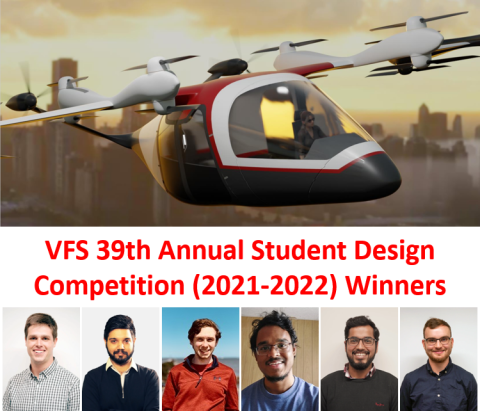
A team of graduate students working at the Center for Mobility with Vertical Lift (MOVE) at Rensselaer Polytechnic Institute was declared the winner of the 39th Annual Student Design Competition (2021-2022) in the Graduate category of the Vertical Flight Society (VFS) for their design “Oliwhoper.”
Each year, the VFS competition challenges students to design a vertical takeoff and landing (VTOL) aircraft that meets specified requirements, providing a practical exercise for engineering students at colleges and universities to promote student interest in VTOL engineering and technology. This year's challenge title was "eVTOL Air Taxi for Passengers with Reduced Mobility (PRM)." Students had to design an eVTOL aircraft with that met the specified air taxi mission. In addition, teams had to design the cockpit, cabin and baggage compartment to accommodate a single pilot and no less than two passengers with disabilities, and alternative seating of four passengers with full mobility. Academic teams from around the world submitted entries in this year’s competition, with a total of 14 proposals from four different countries.
The winning entry in the graduate category was Rensselaer Polytechnic Institute’s “Oliwhoper” eVTOL aircraft, with an accessible cabin design, effective aerodynamic performance and a user-friendly design for all passengers to travel comfortably and reliably to their destination. A spacious cabin design with carefully designed lighting, handholds and audio cues makes it easy for anyone with mobility, visual or auditory challenges to ride safely and easily in comfort. The vehicle design features make it accessible to PRM and allows for operators to flexibly service customers in a variety of locations, without the need for specialized ground equipment. Operators will also appreciate Oliwhoper’s efficient lift + cruise design, which maximizes the performance advantages of distributed electric propulsion, while maintaining the redundancy and control authority expected from modern aircraft.
Using state-of-the-art rotorcraft analysis tools developed at Rensselaer, “our team was able to design a highly efficient 10-rotor aircraft that can complete the 100-mile mission in under 40 minutes using minimal power,” said Richard Healy, a Ph.D. student and captain of the team. “The spacious cabin was also developed with a universal design approach, where features intended for those with disabilities end up improving the experience for everyone. We are thrilled to have won this year’s competition, especially with our relatively small but dedicated team.”
Other team members include: Abhishek Chopra, Alexander Stillman, Anubhav Halder, Gaurav Makkar, and Matthew Bahr.
